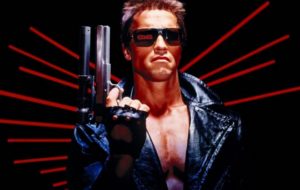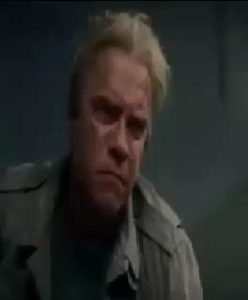1984: The Terminator
October 21, 2019
By AHNZ
 James Cameron’s film The Terminator was released 35 years ago on 26 October 1984. Next week the next film in this series will be released featuring the original casting pair: Arnold Schwarzenegger and Linda Hamilton; Terminator: Dark Fate.
James Cameron’s film The Terminator was released 35 years ago on 26 October 1984. Next week the next film in this series will be released featuring the original casting pair: Arnold Schwarzenegger and Linda Hamilton; Terminator: Dark Fate.
Cameron’s connection to New Zealand is the estate he owns here but also his recent involvement with Just Transition Summit in May 2019. Or, as NZB3 prefers to call it, Storming the Taranaki Energy Castle. Most headlines about this bit of Labour 6.0 propaganda were “…grabbed by director James Cameron and his wife plugging their own gimmick of a plant-based low-emission economy,”; Ref. “Doughnut Economics”; NZB3¹.
The Terminator Saga
The Terminator saga is part of New Zealand’s cultural history, cultural colony of the USA that we are. Behind the action and metaphor this entire project is an exploration in humanity. How to be a man, how to be a woman, gender relations, how to create and protect a modern family.

The Terminator (1984): Powerful sociopathic male (Schwarzenegger) relentlessly pursues innocent, vulnerable, fertility female (Hamilton.) He wants to terminate her pregnancy and snuff out the hope for humanity against a sociopathic machine distopia: her unborn child. This social-evolutionary problem is a force of nature that The Law and Psychology are blind and useless toward. However, vulnerable fertility is saved by a caring disposable male who dies in the process. This male is empathetic but a broken man, shown to be obsolete and unable to compete with the martial strength of a sociopathic cyborg; Hence the existential dilemma. His achievement was to almost prevail but, especially, pass on the skills and confidence of self-protection to the vulnerable woman.
Hamilton’s character ultimately kills the Terminator herself by turning in her protected status and becoming the killer herself. Welcome to late-1980s female empowerment and Third-wave Feminism.
 Terminator 2: Judgment Day (1991): Gone, the family restaurant waitress dressed in pink. Femininity has now become a no-nonsense and non-empathetic survivalist machine herself. Her son remains threatened from without but is tortured and broken, alienated from his incarcerated mother. He is pursuing a life of crime. What needs protecting this time is not innocent femininity but a damaged and separated family. The mother is incarcerated for psychiatric disorder, the son fostered out and going off the rails.
Terminator 2: Judgment Day (1991): Gone, the family restaurant waitress dressed in pink. Femininity has now become a no-nonsense and non-empathetic survivalist machine herself. Her son remains threatened from without but is tortured and broken, alienated from his incarcerated mother. He is pursuing a life of crime. What needs protecting this time is not innocent femininity but a damaged and separated family. The mother is incarcerated for psychiatric disorder, the son fostered out and going off the rails.
We run the simulation again. Instead of one empathetic human father protector the family now has two sociopathic and dangerous parents to go up against the murder bot ‘Terminator’ out to get them. The sociopathic father/husband (Schwarzenegger) is functional but no substitute for a real family man who can fulfil his social obligations. The capabilities he does have in this area are traded off against his ruthless and cold-calculating martial ability. (Eg. His job is complicated by the parameter to find ways to injure but not kill.) This family configuration barely prevails against the homicidal sociopathic Terminator who is also depicted as potentially being anyone around you; People you think are safe might strike out to attack your family in this dangerous world. As before, The Law and Psychology are demonstrated to be blind and useless. As before, the protective male is disposable and is beaten to a critical condition before finally dying in the line of duty as protector.
 Terminator Genisys (2015): Skipping over a few films, the narrative is picked up, albeit with a garbled and confused plot. The simulation on the fictional family is run again. This time, femininity is empathetic and a competent protector all at the same time. Empathetic masculinity is back but is mostly a liability as femininity runs the show and saves his arse. We try again having a sociopathic ally but make him into a father protective figure, “Pops.” It’s a formidable team initially and overcomes all the problems the earlier films struggled with easily. All too easily.
Terminator Genisys (2015): Skipping over a few films, the narrative is picked up, albeit with a garbled and confused plot. The simulation on the fictional family is run again. This time, femininity is empathetic and a competent protector all at the same time. Empathetic masculinity is back but is mostly a liability as femininity runs the show and saves his arse. We try again having a sociopathic ally but make him into a father protective figure, “Pops.” It’s a formidable team initially and overcomes all the problems the earlier films struggled with easily. All too easily.
This was jarring and insulting to the earlier films because it didn’t seem like a fair test. More like some lazy writing with a pocket full of McGuffins rather than a proper artistic/scientific experiment; It was a real mess. The family’s challenge now changed from protecting the young to killing the young because it has become evil. The next generation turns out to be a bad seed, the enemy. It’s as if all that energy put into fighting the external enemy with guns and combat came at the cost of nurturing children on the home front. Absent parents won the battle but lost the war. The problem of the modern family is still an unresolved mess. A reasonable premise but very poorly realised in this film, let alone resolved to the profit of our culture.
 Terminator: Dark Fate (2019): Soon to be released, this film utilises creator James Cameron for the first time since Terminator 2. That ought to ensure a tacit awareness² and sane narrative of the real theme of the Terminator Saga: the modern family.
Terminator: Dark Fate (2019): Soon to be released, this film utilises creator James Cameron for the first time since Terminator 2. That ought to ensure a tacit awareness² and sane narrative of the real theme of the Terminator Saga: the modern family.
The theme in science fiction of how human cultures must adapt to a changing technological world goes way back. One of the greats was Samuel Butler who wrote Erewhon for the Christchurch Press back in 1863 from his sheep station in Canterbury. One solution to machines that have become an enemy of humanity is to smash them all as the Terminator Saga protagonists keep trying to do with “Skynet.” Frank Herbert called this uprising the Butlerian Jihad in his Dune novels, honouring Butler.
Dark Fate can be expected to do a pretty great job of exploring Butler’s theme. We don’t know how it will input the character variables this time or what the conclusion will be as it has yet to be released.
Fertility is again vulnerable and innocent, in need of protection. There appears to be an empathetic male as dazed and confused as he was in Genisys who doesn’t even make the movie poster…I give him 10 minutes to live. Schwarzenegger and Hamilton’s homicidal protectiveness is once again vested in parental protective figures; Useful to have, like Boomer grandparents with resources, but in the outer orbit of the family in terms of being someone a protagonist can share with or relate to or confide in.
The new homicidal sociopathic Terminator enemy is much the same but seems to have a devious facade now. He will speak and reason with the protagonists, he will negotiate and coax, I think. This Terminator will be an advanced version of Google’s predictive text and Facebook’s targeted advertising. He will make reasonable, even generous, offers that the protagonists will need to navigate in order to live in this modern world. Schwarzenegger and Hamilton will not be able to cope with that, their answer will only be to shoot at it and we’ll learn in the first 20mins that this is useless and pathetic.
 What Dark Fate needs, to be another Cameron masterpiece, is to articulate in art the theme of our modern family challenge. The problem-solvers appear to be two women. One woman is the protected fertility, the other is some sort of androgynous cybernetic woman/machine protector. We see her wielding chains and rebar rods as if to emphasise her blunt and mechanistic side just as the original fertility (Hamilton) was dressed up in pink. The Terminator threat is split into inner demon and outer chatbot and the defended has a duality too. These two women are being set up in this film as a problem-solving team to figure out how humans can endure. It appears that part of their solution involves letting the empathetic male get killed off, grieving his death, and moving on.
What Dark Fate needs, to be another Cameron masterpiece, is to articulate in art the theme of our modern family challenge. The problem-solvers appear to be two women. One woman is the protected fertility, the other is some sort of androgynous cybernetic woman/machine protector. We see her wielding chains and rebar rods as if to emphasise her blunt and mechanistic side just as the original fertility (Hamilton) was dressed up in pink. The Terminator threat is split into inner demon and outer chatbot and the defended has a duality too. These two women are being set up in this film as a problem-solving team to figure out how humans can endure. It appears that part of their solution involves letting the empathetic male get killed off, grieving his death, and moving on.
Not Samuel Butler but many others tried to solve this humanity/technology problem by turning society into a Matriarchical Gynecocracy (especially back in the 1970s.) James Cameron with his environmentalist and SWJ attitudes is just the guy to want to do it again so that’s where I think we’re off to on this particular outing. Buckle up for the Sisterhood vs Terminator!
—
1 Incidentally, I purchased Doughnut Economics (retail price $40.00 back in May) at the Ponsonby Cruising Club book sale last weekend for just $2.00. It really is lame.
2 There is never any reason to suppose that an artist knows what his own work is about; That’s the work of philosophers
 Like Comment Share
Like Comment Share





